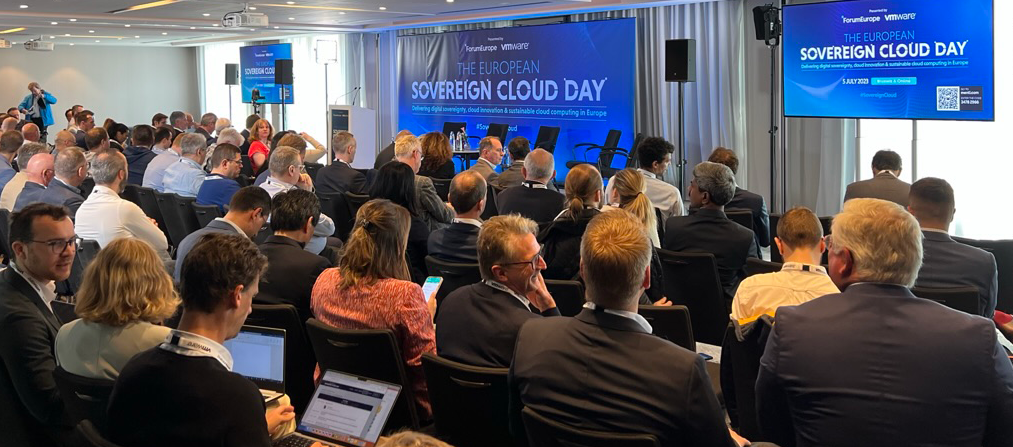The Sovereign Cloud Day was a highly anticipated event organized by VMware that took six months of preparation. The event was a great success, with approximately 200 attendees present in person and an additional 200 participants joining virtually. The attendees comprised EU Delegates, Cloud Provider Partners, Customers, and Service Integrators, making it a diverse and influential gathering. The event marked a significant milestone as VMware hosted its inaugural Sovereign Cloud event in Brussels, showcasing its commitment to addressing Sovereign Cloud’s unique needs and challenges.

The event aimed to discuss what the EU has experienced in recent years, the numerous challenges that have exposed vulnerabilities in IT infrastructure, particularly cloud, and critically to discuss the notion of a Sovereign Cloud. The perception of the Sovereign Cloud differs; however, all could agree that there hasn’t been a more critical time to look at data security and privacy in the cloud, prompting the EU to seek greater control over its digital assets.
Keynote – EU’s Strategic Vision for Driving Innovation and Growth in Cloud Computing

Pearse O’Donohue, Director – Future Networks, DG CONNECT, European Commission
In his speech, Pearse O’Donohue addressed the absence of a clear definition of sovereign cloud but emphasized the strong connection between data sovereignty and the EU’s overall vision of genuine strategic autonomy. He stressed the importance of driving cloud adoption, as only 41% of EU businesses currently use cloud computing, and the Commission expects that cloud computing will be worth about €560 billion to the bloc’s economy. The directive aims to ensure that 75% of businesses are using the cloud by 2030, requiring the collaboration of all providers to make the transition from on-premises to the cloud easier. O’Donohue highlighted the need for Europe to have the capacity to act independently, especially in light of challenges like the COVID-19 pandemic and the conflict in Ukraine, which demonstrated the vulnerability of service provision. The focus is on maintaining openness, competitiveness, and autonomy. The speech also emphasized the importance of data portability, allowing customers to freely and quickly move their data between cloud and on-premises environments. O’Donohue encouraged the industry to establish standards while asserting the need for a secure and protected single market for data in Europe. The willingness of organizations, including VMware, to protect data access is crucial. The EU is assertively leading efforts toward data localization, ensuring data cannot be arbitrarily moved away from its original location.
Keynote – Advancing the Digital Agenda: Spain’s Key Priorities for the Presidency of the Council of the EU

Carme Artigas Brugal, Secretary of State for Digitization and Artificial Intelligence, Government of Spain
In her speech at Sovereign Cloud Day, Carme Artigas Brugal emphasized the importance of recognizing that the issues at hand go beyond just cloud and data. She highlighted the need to determine what is strategic and stressed Spain’s commitment to openness and autonomy as the first pillar of their vision. Carme Artigas called for a debate on emerging technologies like AI and quantum computing, emphasizing the importance of enabling citizens to share their data in a safe and secure manner freely. Trust in cloud, data, and data services was highlighted as crucial, along with the development of edge computing for real-time decision-making. She emphasized the significance of cloud security, collaboration among member states, data lakes in various sectors, and the commitment to achieving a digital future that safeguards citizens and boosts the economy. Carme Artigas acknowledged the challenges in achieving a common position among member states but stressed the importance of prioritizing citizen rights and establishing transparency and control over the layers of technology used. She encouraged collaboration, embracing open-source technology, and taking decisive action to address data protection concerns and accelerate progress and said that organisations need to read the signs of our times: the demand for digital sovereignty needs to be addressed.
Keynote– Having European Sovereign Cloud Solutions: a necessity for European users which must become a reality

Sylvain Rouri, Chief Sales Officer, OVHcloud
In his speech, Sylvain Rouri emphasized the importance of understanding the underlying layers of technology. He highlighted that achieving digital sovereignty requires three key aspects: data sovereignty, technical sovereignty, and operational sovereignty. Sylvain drew attention to the lack of transparency in the digital and cloud industry, comparing it to the ambiguity surrounding claims of environmental sustainability. He stressed the urgency of addressing climate change and the need for collaboration, swift action, and decisive decision-making. Despite the challenges, Sylvain expressed confidence in our ability to make the necessary changes for a sustainable future.
Keynote– Sovereign Cloud and the role of infrastructure

Alfredo Nulli, Head of Portfolio – Innovation and Center of Excellence, TIM Enterprise
In his speech, Alfredo Nulli discussed the challenges and objectives of designing a government-controlled cloud infrastructure. He emphasized the need to follow rules (that still need to be established) and ensure the accuracy and protection of citizens’ data. Nulli described TIM’s journey in building a cloud without a defined framework in place. One of the key considerations was determining the cost of sovereign control and whether it should be applied to every cloud offering. Nulli questioned the financial implications and the decision-making process involved. In Italy, classifying data by cyber agencies (critical, strategic, ordinary) played a role in determining which workloads require sovereign control. The access to edge and various use cases presented different considerations, focusing on providing services near customers. Alfredo acknowledged that their framework needs to be fully covered because many of the laws still need to exist, but emphasized that it marks an initial step towards achieving their goals.
Panel 1 – Cloud Services Provider Panel: Meeting the Growing Demand for Sovereign Cloud Solutions

Opening the discussion, the speakers addressed the growing demand for sovereign cloud solutions. Nassima Auvray from Orange emphasized the importance of digital trust, where sovereignty is viewed as an attribute of states. Trusted solutions should comply with security, data availability, and regulations like GDPR, and navigate technology dependencies. Alexander Wallner from Plusserver highlighted the significance of legislation origin and regional importance for restricted verticals like healthcare and finance. Darren Adcock from Redcentric discussed the trust and audit needed to ensure data security and privacy. He also mentioned the demand for seamless transformation in the public sector, including consolidation of data sets. Miguel Gomez Rodriguez from Telefonica emphasized the differentiation of sovereign clouds, the current lack of standards, and the need for tailored professional and managed services. Larik Verschuren from Fundaments mentioned the primary cloud conversation being cost, the transition from CapEx to OpEx being a journey, and the importance of data protection and governance. Guy Bartram from VMware added a final message, stressing the importance of data protection, the EU’s push for increased cloud adoption, and the need to consider and evaluate data classification.
Panel 2: Ensuring Cloud Sovereignty in Europe: Panel discussion examining essential Regulatory Frameworks and their impact

Several key points were raised during the panel discussion on ensuring cloud sovereignty in Europe. Andreas Schwab highlighted concerns about SMEs being reluctant to put their data in the cloud due to fears of losing control. Robert Condon discussed the drivers of sovereign cloud, including capability building, compliance, and the importance of choice, control, and context in delivering sovereign cloud solutions. Pascal Rogard emphasized the need for secure and sovereign clouds across Europe, avoiding fragmented rules, and building client trust. Derek Rodenberg discussed the characteristics of sovereign clouds, such as security and data portability, and the importance of understanding data regulation. Pierre Chastanet emphasized a risk-based approach to cybersecurity, the need for clarity and collaboration with trusted trading partners, and the expectation for companies to work on standards and certification. He also stated that the European Commission now expects the EU Data Act to break down the barrier for cloud switching, to make data portability easier, and to help organisations move to the multicloud era. The panel also discussed the interoperability, compliance, and market size challenges.
Keynote Speech – Balancing Sustainability and Sovereignty: The growing demand for Sovereignty and Sustainable Cloud Computing

Ilias Iakovidis, Adviser, Digital Aspect of Green Transition, DG CONNECT, European Commission
The keynote speech from Ilias Iakovidis highlighted the historical disconnect between the environment and technology over the past 30 years. Ilias acknowledged that society was oblivious to the environmental impact of technology, considering it a non-issue for the IT sector. However, Ilias emphasized that the situation has changed, with technology now accounting for 3% of total emissions and being the fastest-growing waste category. The missed opportunity to proactively address these issues was acknowledged. Ilias stated that digitization is viewed by 70% of people as a pollution problem. To counter this perception, a coalition has been formed to promote the positive potential of digitization. Ilias supports the EU’s push for a circular economy to minimize waste and maximize resource efficiency. This shift involves moving away from the linear ” take-make-dispose ” model to a “reduce, reuse, and repurpose” practice. In a circular economy, everything is designed for reusability, repairability, and recycling, reducing waste and preserving resources. Lakovidis also emphasizes the importance of a Digital Product Passport, which provides information about a product’s composition, origin, and environmental impact throughout its life cycle. By making this data transparent and accessible, consumers can make informed choices on products with lower environmental impact. These efforts aim to create a greener industrial Europe and pave the way for an economy focused on service-based models and the emergence of new EU-funded businesses that support green digital.
VMware is proud to lead the way with our Sovereign Cloud strategy, helping organizations find the right partner to help them with their Sovereign Cloud strategy. Remember, you can join the conversation; simply head over to LinkedIn and join our Sovereign Cloud group to keep informed about all things Sovereign Cloud. We will post replays to each session in the coming weeks, so please bookmark https://www.vmware.com/cloud-solutions/sovereign-cloud.html.





